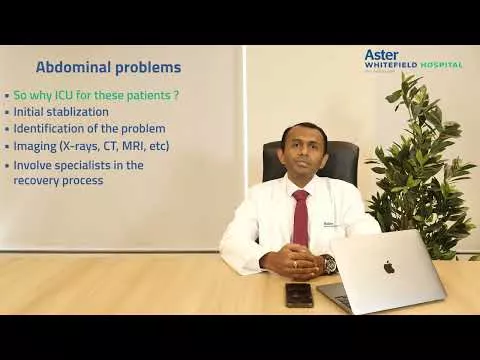Dr. Venkatesh Gupta K.V., a distinguished consultant in Critical Care Medicine at Aster Whitefield Hospital explains how they manage critical situations involving kidney problems. Acute Kidney Failure (AKF) is a sudden and severe decline in kidney function. When kidneys fail, waste products and fluids build up in the body, leading to various complications.
Interventions in the ICU
- Non-invasive Ventilation: This method uses a mask or other device to deliver oxygen to the lungs without the need for a breathing tube.
- Mechanical Ventilation: If non-invasive ventilation isn't sufficient, a machine can be used to help the patient breathe by mechanically forcing air into the lungs through a breathing tube.
- Dialysis: This is a process that removes waste products and excess fluid from the blood when the kidneys can no longer do it effectively. Two main types of dialysis are explained in the hospital setting: hemodialysis (using a machine) and peritoneal dialysis (using the abdomen).
- Monitoring: Close monitoring of vital signs like blood pressure, oxygen levels, and kidney function allows for timely adjustments in treatment.
Use of advanced diagnostics in the ICU
- Bedside Ultrasound: This allows doctors to quickly visualize the kidneys and surrounding structures to assess for blockages or other abnormalities.
- CT Scan: A CT scan can provide detailed images of the kidneys and urinary tract to identify blockages or other structural issues.
A key strength of Aster Whitefield Hospital is our comprehensive care approach. The ICU has access to specialists from various departments, including Nephrology, Urology, and others, allowing for a multidisciplinary approach to address all aspects of the patient's kidney-related critical illness.
To book an appointment, call 080-4510 8888.







